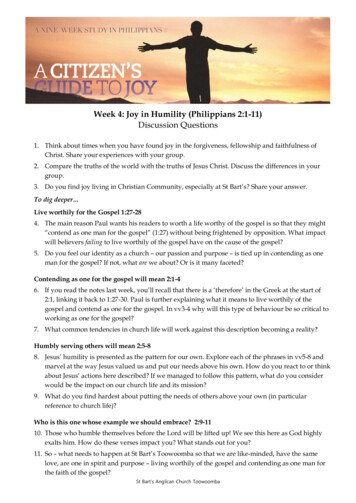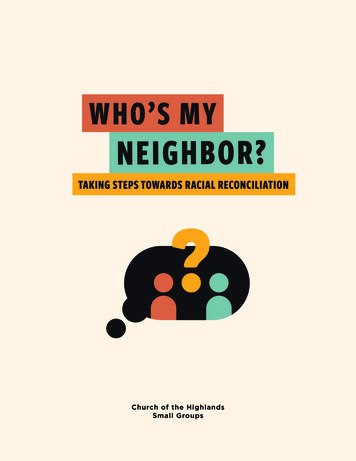
Transcription
Week 4: Joy in Humility (Philippians 2:1-11)Discussion Questions1. Think about times when you have found joy in the forgiveness, fellowship and faithfulness ofChrist. Share your experiences with your group.2. Compare the truths of the world with the truths of Jesus Christ. Discuss the differences in yourgroup.3. Do you find joy living in Christian Community, especially at St Bart’s? Share your answer.To dig deeper Live worthily for the Gospel 1:27-284. The main reason Paul wants his readers to worth a life worthy of the gospel is so that they might“contend as one man for the gospel” (1:27) without being frightened by opposition. What impactwill believers failing to live worthily of the gospel have on the cause of the gospel?5. Do you feel our identity as a church – our passion and purpose – is tied up in contending as oneman for the gospel? If not, what are we about? Or is it many faceted?Contending as one for the gospel will mean 2:1-46. If you read the notes last week, you’ll recall that there is a ‘therefore’ in the Greek at the start of2:1, linking it back to 1:27-30. Paul is further explaining what it means to live worthily of thegospel and contend as one for the gospel. In vv3-4 why will this type of behaviour be so critical toworking as one for the gospel?7. What common tendencies in church life will work against this description becoming a reality?Humbly serving others will mean 2:5-88. Jesus’ humility is presented as the pattern for our own. Explore each of the phrases in vv5-8 andmarvel at the way Jesus valued us and put our needs above his own. How do you react to or thinkabout Jesus’ actions here described? If we managed to follow this pattern, what do you considerwould be the impact on our church life and its mission?9. What do you find hardest about putting the needs of others above your own (in particularreference to church life)?Who is this one whose example we should embrace? 2:9-1110. Those who humble themselves before the Lord will be lifted up! We see this here as God highlyexalts him. How do these verses impact you? What stands out for you?11. So – what needs to happen at St Bart’s Toowoomba so that we are like-minded, have the samelove, are one in spirit and purpose – living worthily of the gospel and contending as one man forthe faith of the gospel?St Bart’s Anglican Church Toowoomba
Talk 4/9 (Philippians 2:1-11): 10/08/14“Joy in Humility” by the Rev’d Dr Daniel RouheadINTRODUCTION \\ HUMILITY!We continue our study on Paul’s letter to the Philippians. In the midst of hiscircumstances, Paul finds joy and contentment in Christ while imprisoned, awaitingtrial and facing potential execution. The letter is so challenging because, like Paul, weare called to live lives of joy in the ups and downs of our circumstances. Over the last3 weeks, Adam has explored Joy in Loneliness, Joy in Suffering and Joy in Death.Today, we are challenged by the passage from Philippians to be joyful in humility.Has anyone ever wondered if their children were listening to them? Sometimes itseems as though our words are going in one ear and out the other. That is, until theyuse our own words against us. It stops us in our tracks when we hear our own wordsbeing spoken to us. In attempting to describe for the Philippians the mind or spirit orwisdom of Christ that they should imitate, Paul employs the strategy of a wisepastoral leader: he invites them to consider their own words.This passage about Jesus, in verses 5-11, was most likely a hymn, you see, a hymnthat the Philippians had probably sung in their worship on numerous occasions.Now, knowing of their struggles, of their hardship, or the threats both external andinternal they faced, Paul invites them to sing that hymn again, this time taking mostseriously what it says about Jesus and, in this way, how they might drawencouragement from it.It might seem difficult to find joy and encouragement in humility. In fact, it can bequite challenging to define humility. Humility is not about downplaying one's ownfaith, gifts, talents, and accomplishments for the sake of receiving praise or adulationfrom others. As C.S. Lewis wrote: Humility is not thinking less of yourself, butthinking of yourself less. This longer quote develops that idea more fully:“Do not imagine that if you meet a really humble man hewill be what most people call “humble” nowadays: he willnot be a sort of greasy, smarmy person, who is alwaystelling you that, of course, he is nobody. Probably all youwill think about him is that he seemed a cheerful,intelligent chap who took a real interest in what you saidto him. If you do dislike him it will be because you feel alittle envious of anyone who seems to enjoy life so easily.He will not be thinking about humility: he will not bethinking about himself at all.”C.S. Lewis, Mere ChristianityWe hear this so powerfully in verses 3 and 4:Do nothing out of selfish ambition or vain conceit. Rather,in humility value others above yourselves, not looking to
your own interests but each of you to the interests of theothers.Philippians 2:3-4Christian humility is characterized by the following features:1. Submitting to God and Christ’s legitimate authority2. Recognizing virtues and talents that others possess, particularly those thatsurpass your own, and giving due honor and, when required, obedience3. Being honest and content with your own talents, ability, or authority;recognising your limits and, not reaching for what is beyond your grasp4. Using your own gifts and talents in the service of othersWhere, then, is the joy in these things? Humility seems like hard work, the realm ofthose specially gifted or really faithful. We find joy, firstly, in the person of JesusChrist; secondly, in the truths of Jesus Christ; and, thirdly, in the people of God.1. The Person of Jesus \\ Verses1-2It is humbling to acknowledge that apart from God, we are broken, lost and sinful.On the other hand, pride tells us that we are OK, emphasising our strengths, andforgetting about our weaknesses. New age spirituality tells us that we just need toconnect with our inner strength and the energy of the universe and we’ll be all we canbe. It is challenging to be honest about who we are: sinful and in need of salvation.Joy comes in the person of Jesus Christ. God did not leave us alone in ourbrokenness, but sent his son.Therefore if you have any encouragement from being unitedwith Christ, if any comfort from his love, if any commonsharing in the Spirit, if any tenderness and compassion,then make my joy complete by being like-minded, having thesame love, being one in spirit and of one mind.Philippians 2:1-2By being united to Christ by faith, we are made whole, and can experience joythrough the forgiveness, fellowship and faithfulness of Christ. Humility is anessential ingredient though in experiencing Christ’s forgiveness, fellowship andfaithfulness.We are united with Christ through forgiveness. But before we can experience Christ’sforgiveness, we need humility to acknowledge that we need Christ’s forgiveness.Pride tells us if we’re a good person we don’t need forgiveness. But one of the mostbasic needs of human beings is to experience the forgiveness and reconciliation thatChrist has made possible through his death and resurrection.Forgiveness is at the heart of Jesus’ ministry. In Mark, Chapter 2, when he heals theparalysed man, he challenges his listeners with these words:
Which is easier: to say to this paralysed man, ‘Your sinsare forgiven,’ or to say, ‘Get up, take your mat and walk’?But I want you to know that the Son of Man has authority onearth to forgive sins.”Mark 2:9-10When Peter speaks to the Sanhedrin, as recorded in Acts Chapter 5, he alsoemphasises the forgiveness that Jesus brings:God exalted him to his own right hand as Prince and Saviourthat he might bring Israel to repentance and forgive theirsins.Acts 5:31We are united to Christ in fellowship, in his love, tenderness and compassion. It ishumbling to acknowledge that the creator of the universe desires an intimaterelationship with each one of us. Jesus is not just our Saviour, our Lord, our King,Jesus is also our friend. We might be humbled to the point where we don’t feelworthy of this friendship, but Christ makes us worthy, and this friendship can be agreat source of Joy, in all circumstances.Jesus says these words to his disciples before his death to reinforce the intimaterelationship Jesus desires with his followers:You are my friends if you do what I command. I no longercall you servants, because a servant does not know hismaster’s business. Instead, I have called you friends, foreverything that I learned from my Father I have made knownto you.John 15:14-15Paul also reminds us in 1 Corinthians about God’s call to fellowship with Christ:God is faithful, who has called you into fellowship withhis Son, Jesus Christ our Lord.1 Corinthians 1:9We are united to Christ by his faithfulness. We have all been let down by otherpeople, be they family, friends, colleagues, employees and so on. Jesus has promisedto be with us, even to the end of the age, to be faithful always. Pride can put barriersbetween us and others, create mistrust, whereas humility allows trust to flourish.This trust in Christ is also a great source of joy in all different circumstances. Paulwrites of Christ’s faithfulness in 2 Timothy.If we died with him, we will also live with him;if we endure, we will also reign with him.If we disown him, he will also disown us;
if we are faithless, he remains faithful,for he cannot disown himself.2 Timothy 2:11-132. The Truths of Jesus \\ Verses 5-11We experience joy in the truths of Jesus, summarised beautifully in the hymn ofverses 6-11. This also requires humility because it acknowledges that we, as humanbeings, can’t find meaning, and joy and answers to the big questions on our own. Weknow the truth, because it has been revealed in the life and teachings of Christ.Who, being in very nature God,did not consider equality with God something to be usedto his own advantage;rather, he made himself nothingby taking the very nature of a servant,being made in human likeness.And being found in appearance as a man,he humbled himselfby becoming obedient to death—even death on a cross!Therefore God exalted him to the highest placeand gave him the name that is above every name,that at the name of Jesus every knee should bow,in heaven and on earth and under the earth,and every tongue acknowledge that Jesus Christ is Lord,to the glory of God the Father.Philippians 2:6-11We learn the following truths about Jesus:Jesus is GodJesus doesn’t cling to his status as GodJesus takes the form of a servantJesus becomes fully humanJesus is fully obedient to his heavenly fatherJesus dies on the crossJesus has been raised and exaltedOne day, all creation will acknowledge Christ as LordIt requires humility to hear these words because they show how dependent we are onChrist, but joy comes from accepting the magnitude of what Jesus has done for us. Italso requires humility to hear these truths, because we are called to follow in Jesus’footsteps. Yes, there can be pain and suffering in following Jesus’ example, but joycomes through serving others and being raised with Christ.
3. God’s People \\ Verses 3-4Finally, we experience humility when we live in community with our brothers andsisters in Christ. It is Christ that draws us together, and so we can be a group of verydifferent people – but it is amazing to think of the range of gifts and talents thatChrist does draw together, we only have to look here at St Bart’s to see this in action.Do nothing out of selfish ambition or vain conceit. Rather,in humility value others above yourselves, not looking toyour own interests but each of you to the interests of theothers.Philippians 2:3-4Humility is required in two different ways. The first is to place the needs of othersbefore your own. We still live in a world of “Me First!” or perhaps just “Me!” Jesus,by his own example, calls us to a life of humble service. Jesus is the King of Kings andLord of Lords, but his arrival as a helpless baby was indicative of the type of life hewould live:For even the Son of Man did not come to be served, but toserve, and to give his life as a ransom for many.Mark 10:45The second is to acknowledge that we need the ministry of others in our life. Pridetells us that we don’t need others, because we can do it all ourselves, we are selfsufficient. Humility allows us to be honest about our limitations, and helps us to askfor, and accept, help or ministry from others. Remember, when Jesus asked hisfriends to pray for him in the Garden of Gethsemane, the night before he died. Hetold them to “Stay here and keep watch” (Mark 14:34), and to “watch and pray”(Mark 14:38), and was disappointed when they let him down by falling asleep.The joy comes from knowing that we can serve others through our gifts and talents,encouraging others and building them up. Joy also comes from receiving ministryfrom others, being built up and encouraged by the love and gifts of others in ourcommunity. That is the heart of Christian community, loving one another, servingone another, and building each other up, with Christ as our example and leader.CONCLUSIONHumility is so critical because it allows us to receive the grace of God, and allows usto receive grace from our brothers and sisters in Christ. Pride puts up the barriersbetween us and God, and between us and other people, not only having a negativeeffect on ourselves, but on our community. If joy comes from our relationship withGod in Christ and our relationships with others, then without humility our joy will beincomplete.
I’m sure you will recognise these words from a famous song:Oh Lord it's hard to be humblewhen you're perfect in every way.Davis Mac - Oh Lord It's Hard To Be HumbleIn humility, we acknowledge that we aren’t perfect, but we are joyful because ofChrist’s forgiveness, fellowship and faithfulness. In humility, we acknowledge that wedon’t know everything, but we are joyful because in Jesus we know the truths thatreally count. In humility, we acknowledge that we depend on one another, but we arejoyful because together we are more than the sum of our different parts.Let us this week, and always, “do nothing out of selfish ambition or vain conceit.Rather, in humility value others above ourselves, not looking to our own interests buteach of us to the interests of others.”Amen.
Week 4: Joy in Humility (Philippians 2:1-11) Discussion Questions 1. Think about times when you have found joy in the forgiveness, fellowship and faithfulness of Christ. Share your experiences with your group. 2. Compare the truths of the world with the truths o










